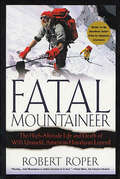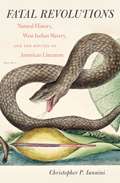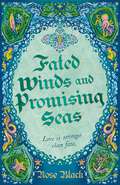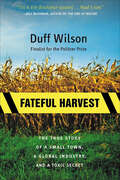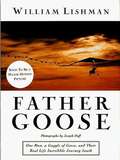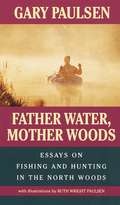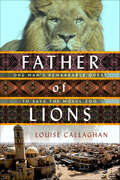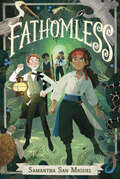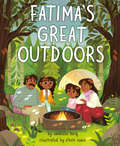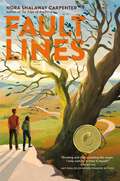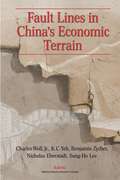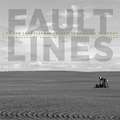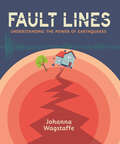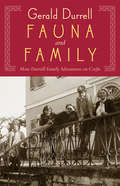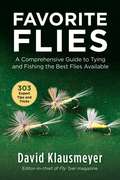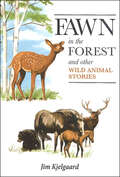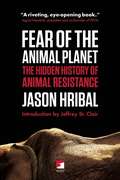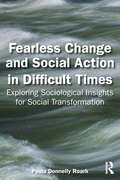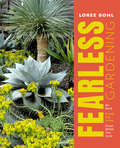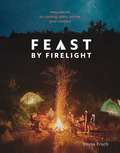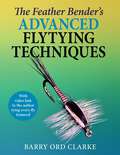- Table View
- List View
Fatal Mountaineer: The High-Altitude Life and Death of Willi Unsoeld, American Himalayan Legend
by Robert RoperRobert Roper's Fatal Mountaineer is a gripping look at Willi Unsoeld and the epic climbs that defined him--a classic narrative blending action with ethics, fame with tragedy, a man's ambition with a father's anguish.In 1963, Willi Unsoeld became an international hero for his conquest of the West Ridge of Everest. A charismatic professor of philosophy, Unsoeld was one of the greatest climbers of the twentieth century, a man whose raw physical power and casual fearlessness inspired a generation of adventurers. In 1976, during an expedition to Nanda Devi, the tallest peak in India, Unsoeld's philosophy of spiritual growth through mortal risk was tragically tested. The outcome of that expedition continues to fuel one of the most fascinating debates in mountaineering history.
Fatal Revolutions
by Christopher P. IanniniDrawing on letters, illustrations, engravings, and neglected manuscripts, Christopher Iannini connects two dramatic transformations in the eighteenth-century Atlantic world--the emergence and growth of the Caribbean plantation system and the rise of natural science. Iannini argues that these transformations were not only deeply interconnected, but that together they established conditions fundamental to the development of a distinctive literary culture in the early Americas. In fact, eighteenth-century natural history as a literary genre largely took its shape from its practice in the Caribbean, an oft-studied region that was a prime source of wealth for all of Europe and the Americas. The formal evolution of colonial prose narrative, Ianinni argues, was contingent upon the emergence of natural history writing, which itself emerged necessarily from within the context of Atlantic slavery and the production of tropical commodities. As he reestablishes the history of cultural exchange between the Caribbean and North America, Ianinni recovers the importance of the West Indies in the formation of American literary and intellectual culture as well as its place in assessing the moral implications of colonial slavery.
Fated Winds and Promising Seas: A tender-hearted tale of forging fates, fantastic creatures, and found family
by Rose Black'An absolute bear-hug of a book!' SANGU MANDANNAWhen a promise is made, a fate is woven.Imprisoned for a crime he cannot remember committing, Lucky is more comfortable with the four walls of his cell than the world outside. That is until he's ripped free from his prison and swept out into the ocean. . . and rescued by The Dreamer.But The Dreamer is no ordinary vessel, with its crew of outcasts and heretics who possess the ability to manipulate water. Lucky is taken under the protective wing of a sailor named Gabriel, but when he recognises Gabriel from his past, Lucky suspects it may not be a simple accident that threw them together.To understand their connection and prove Lucky's innocence, they must navigate treacherous waters, avoid giant Leviathan, and outwit those seeking to arrest them. But some memories hide secrets that could destroy all that they love. And with the tides of fortune ever-changing, the quest for freedom is just the beginning. Fated Winds and Promising Seas is a queer fantasy, perfect for fans of Legends and Lattes and Nettle and Bone.THEMES AND TROPES! Mental health rep, MM romance, found family, magical ships, safe and cared for, sharing the same room, gay romance novel, happily ever after!READER REVIEWS FOR TIL DEATH DO US BARD:'THIS IS EVERYTHING!' ⭐⭐⭐⭐⭐'Joyous, uplifting, heart warming' ⭐⭐⭐⭐⭐'The romance, the adventure, the cast of characters. Every time I think about this book it puts a smile on my face' ⭐⭐⭐⭐⭐'This book felt like a cozy game of D&D with a side of romance and I loved every minute of it!' ⭐⭐⭐⭐⭐'I highly recommend this to anyone who likes cozy fantasy, D&D and/or Our Flag Means Death!' ⭐⭐⭐⭐⭐'Sometimes you just find a book where you see the cover, find it intriguing, read the synopsis, find that even more intriguing and then you read the book and it's everything you wanted' ⭐⭐⭐⭐⭐
Fated Winds and Promising Seas: A tender-hearted tale of forging fates, fantastic creatures, and found family
by Rose Black'An absolute bear-hug of a book!' SANGU MANDANNAWhen a promise is made, a fate is woven.Imprisoned for a crime he cannot remember committing, Lucky is more comfortable with the four walls of his cell than the world outside. That is until he's ripped free from his prison and swept out into the ocean. . . and rescued by The Dreamer.But The Dreamer is no ordinary vessel, with its crew of outcasts and heretics who possess the ability to manipulate water. Lucky is taken under the protective wing of a sailor named Gabriel, but when he recognises Gabriel from his past, Lucky suspects it may not be a simple accident that threw them together.To understand their connection and prove Lucky's innocence, they must navigate treacherous waters, avoid giant Leviathan, and outwit those seeking to arrest them. But some memories hide secrets that could destroy all that they love. And with the tides of fortune ever-changing, the quest for freedom is just the beginning. Fated Winds and Promising Seas is a queer fantasy, perfect for fans of Legends and Lattes and Nettle and Bone.THEMES AND TROPES! Mental health rep, MM romance, found family, magical ships, safe and cared for, sharing the same room, gay romance novel, happily ever after!READER REVIEWS FOR TIL DEATH DO US BARD:'THIS IS EVERYTHING!' ⭐⭐⭐⭐⭐'Joyous, uplifting, heart warming' ⭐⭐⭐⭐⭐'The romance, the adventure, the cast of characters. Every time I think about this book it puts a smile on my face' ⭐⭐⭐⭐⭐'This book felt like a cozy game of D&D with a side of romance and I loved every minute of it!' ⭐⭐⭐⭐⭐'I highly recommend this to anyone who likes cozy fantasy, D&D and/or Our Flag Means Death!' ⭐⭐⭐⭐⭐'Sometimes you just find a book where you see the cover, find it intriguing, read the synopsis, find that even more intriguing and then you read the book and it's everything you wanted' ⭐⭐⭐⭐⭐
Fated Winds and Promising Seas: A tender-hearted tale of forging fates, fantastic creatures, and found family
by Rose Black'An absolute bear-hug of a book!' SANGU MANDANNAWhen a promise is made, a fate is woven.Imprisoned for a crime he cannot remember committing, Lucky is more comfortable with the four walls of his cell than the world outside. That is until he's ripped free from his prison and swept out into the ocean. . . and rescued by The Dreamer.But The Dreamer is no ordinary vessel, with its crew of outcasts and heretics who possess the ability to manipulate water. Lucky is taken under the protective wing of a sailor named Gabriel, but when he recognises Gabriel from his past, Lucky suspects it may not be a simple accident that threw them together.To understand their connection and prove Lucky's innocence, they must navigate treacherous waters, avoid giant Leviathan, and outwit those seeking to arrest them. But some memories hide secrets that could destroy all that they love. And with the tides of fortune ever-changing, the quest for freedom is just the beginning. Fated Winds and Promising Seas is a queer fantasy, perfect for fans of Legends and Lattes and Nettle and Bone.THEMES AND TROPES! Mental health rep, MM romance, found family, magical ships, safe and cared for, sharing the same room, gay romance novel, happily ever after!READER REVIEWS FOR TIL DEATH DO US BARD:'THIS IS EVERYTHING!' ⭐⭐⭐⭐⭐'Joyous, uplifting, heart warming' ⭐⭐⭐⭐⭐'The romance, the adventure, the cast of characters. Every time I think about this book it puts a smile on my face' ⭐⭐⭐⭐⭐'This book felt like a cozy game of D&D with a side of romance and I loved every minute of it!' ⭐⭐⭐⭐⭐'I highly recommend this to anyone who likes cozy fantasy, D&D and/or Our Flag Means Death!' ⭐⭐⭐⭐⭐'Sometimes you just find a book where you see the cover, find it intriguing, read the synopsis, find that even more intriguing and then you read the book and it's everything you wanted' ⭐⭐⭐⭐⭐
Fateful Harvest: The True Story of a Small Town, a Global Industry, and a Toxic Secret
by Duff WilsonI see soil in a new light, and I wonder about my own lawn and garden. What have I sprinkled on my backyard? Is somebody using my home, my food, to recycle toxic waste? It seems unbelievable, outlandish -- but what if it's true?A riveting expose, Fateful Harvest tells the story of Patty Martin -- the mayor of a small Washington town called Quincy -- who discovers American industries are dumping toxic waste into farmers' fields and home gardens by labeling it "fertilizer." She becomes outraged at the failed crops, sick horses, and rare diseases in her town, as well as the threats to her children's health. Yet, when she blows the whistle on a nationwide problem, Patty Martin is nearly run out of town.Duff Wilson, whose Seattle Times series on this story was a finalist for the Pulitzer Prize, provides the definitive account of a new and alarming environmental scandal. Fateful Harvest is a gripping study of corruption and courage, of recklessness and reckoning. It is a story that speaks to the greatest fears -- and ultimate hope -- in us all.
Father Goose: One Man, a Gaggle of Geese and Their Real Life Incredible Journey South
by William Lishman Joseph DuffFeatured on an enormously popular 20/20 segment, this heartwarming story tells of William Lishman, a reclusive sculptor, who adopted a gaggle of geese, flew with them in an ultralight glider, and actually taught them to migrate--earning himself the nickname "Father Goose. "
Father Water, Mother Woods: Essays on Fishing and Hunting in the North Woods
by Gary Paulsen Ruth Wright PaulsenSurvival in the wilderness--Gary Paulsen writes about it so powerfully in his novels Hatchet and The River because he's lived it. These essays recount his adventures alone and with friends, along the rivers and in the woods of northern Minnesota. There, fishing and hunting are serious business, requiring skill, secrets, and inspiration. Luck, too--not every big one gets away.This book takes readers through the seasons, from the incredible taste of a spring fish fresh from the smokehouse, to the first sight of the first deer, to the peace of the winter days spent dreaming by the stove in a fishhouse on the ice. In Paulsen's north country, every expedition is a major one, and often hilarious.Once again Gary Paulsen demonstrates why he is one of America's most beloved writers, for he shows us fishing and hunting as pleasure, as art, as companionship, and as sources of life's deepest lessons.From the Paperback edition.
Father of Lions: One Man's Remarkable Quest to Save the Mosul Zoo
by Louise CallaghanFather of Lions is the powerful true story of the evacuation of the Mosul Zoo, featuring Abu Laith the zookeeper, Simba the lion cub, Lula the bear, and countless others, faithfully depicted by acclaimed, award-winning journalist Louise Callaghan in her trade publishing debut.Combining a true-to-life narrative of humanity in the wake of war with the heartstring-tugging account of rescued animals, Father of Lions will appeal to audiences of bestsellers like The Zookeeper’s Wife and The Bookseller of Kabul as well as fans of true animal stories such as A Streetcat Named Bob, Marley and Me, and Finding Atticus.“An unexpectedly funny and moving book. ... Through the story of a man who loves both lions and life, Louise Callaghan shows how humour and defiance can counter cruelty, and why both humans and animals crave freedom.” -- Lindsey Hilsum, International Editor, Channel 4 News and author of In Extremis: the life of war correspondent Marie Colvin.At the Publisher's request, this title is being sold without Digital Rights Management Software (DRM) applied.
Fathomless (Spineless)
by Samantha San Miguel&“Pure storytelling at its best.&”—Kirkus Reviews, Starred Review Ghostly pirates, lost treasure, and high adventure abound in Fathomless, the sequel to Spineless, set in glittering Gilded Age Florida. After months away at boarding school, Lulu Davenport was looking forward to summer vacation at her home on the southwest Florida coast, especially since her best friend, Algie Emsworth, will be spending his vacation with the Davenport family. But since his widowed mother has fallen on hard times, he&’s gotten a job nearby that keeps him away from the house most of the day. And Frankie, Lulu&’s sister and usual companion, is out of commission after injuring herself while sailing. But when Lulu hears about a possible haunting in a nearby abandoned fort and rumors of hidden treasure, she decides it&’s time to strike out on her own and solve the mystery herself. In the process, she meets Vic, a blind boy who&’s just moved to town, and the two of them embark on a hunt for clues about the ghostly appearances. Soon enough, Frankie and Algie join them, and the four friends uncover all sorts of very real dastardly deeds going on, and the villain is much closer to home than they expected!Fathomless is full of hijinks, mystery, and heart, as Samantha San Miguel brings readers into the wild and wonderful world of nineteenth century Florida in this sparkling sequel to Spineless.
Fatima's Great Outdoors
by Ambreen TariqAn immigrant family embarks on their first camping trip in the Midwest in this lively picture book by Ambreen Tariq, outdoors activist and founder of @BrownPeopleCampingFatima Khazi is excited for the weekend. Her family is headed to a local state park for their first camping trip! The school week might not have gone as planned, but outdoors, Fatima can achieve anything. She sets up a tent with her father, builds a fire with her mother, and survives an eight-legged mutant spider (a daddy longlegs with an impressive shadow) with her sister. At the end of an adventurous day, the family snuggles inside one big tent, serenaded by the sounds of the forest. The thought of leaving the magic of the outdoors tugs at Fatima's heart, but her sister reminds her that they can keep the memory alive through stories--and they can always daydream about what their next camping trip will look like.Ambreen Tariq's picture book debut, with cheerful illustrations by Stevie Lewis, is a rollicking family adventure, a love letter to the outdoors, and a reminder that public land belongs to all of us.
Fault Lines
by Nora Shalaway CarpenterRiveting, powerful, and a little bit magical, Fault Lines offers readers a slow-burn romance alongside an unflinching examination of socio-economics, gender expectations, and environmental ethics. Ever since her aunt died four months ago, seventeen-year-old Vivian (Viv) Spry is aching to figure out where she belongs. Her father has become emotionally distant and even her best friend has found a new sense of identity in her theater group. Unfortunately, nobody in her rural West Virginia town has time for an assertive, angry girl, especially a girl dubbed &“Ice Queen&” for refusing to sleep with her popular boyfriend. On top of everything, she discovers a strange ability to sense energy that really freaks her out. The only place Viv feels like it&’s safe to be her true self is the tree stand where her aunt taught her to hunt. It's the one place she still feels connected to the person who knew her best. So when fracking destroys the stand and almost kills her, Viv vows to find a way to take the gas company down. When Dex Mathews comes to town—a new kid whose mom lands a job laying pipeline—his and Viv's worlds collide and a friendship (and maybe more?) slowly blossoms. But Viv&’s plan to sabotage the pipeline company could result in Dex&’s mom losing her job, putting them on the streets. Now Viv and Dex have to decide what&’s worth fighting for—their families, their principles, or each other.
Fault Lines in China's Economic Terrain
by K. C. Yeh Charles Jr. Wolf Nicholas Eberstadt Benjamin Zycher Sungho LeeThe authors consider how and by how much China's stellar economic performance might be impaired by eight potential adversities that China may face in the next decade: unemployment, poverty, and social unrest; corruption; HIV/AIDS and epidemic diseases; water resource problems and pollution; energy consumption and prices; the fragile financial system and state-owned enterprises; curtailed foreign direct investment; and serious military conflicts.
Fault Lines: Life and Landscape in Saskatchewan's Oil Economy
by Emily Eaton Valerie ZinkOil is not new to Saskatchewan. Many of the wells found on farmland across the province date back to the 1950s when the industry began to spread. But there is little doubt that the recent boom (2006–2014) and subsequent downturn in unconventional oil production has reshaped rural lives and landscapes. While many small towns were suffering from depopulation and decline, others reoriented themselves around a booming oil industry. In place of the abandoned houses and shuttered shops found in many small towns in Saskatchewan, housing developments sprang up with new trucks and boats parked in driveways. Yet people in oil-producing areas also lived amid flare stacks that made them ill, had trouble finding housing due to vacancy rates that were among the lowest in the country, suffered through family breakdown because of long working hours and time spent away from home, and endured spills and leaks that contaminated their land. In the summer of 2014, at the height of the boom, geographer Emily Eaton and photographer Valerie Zink travelled to oil towns across the province, from the sea-can motel built from shipping containers on the outskirts of Estevan to seismic testing sites on Thunderchild First Nation’s Sundance grounds.
Fault Lines: Understanding the Power of Earthquakes
by Johanna WagstaffeEarthquakes are a terrifying yet fascinating force of nature. Seismologist Johanna Wagstaffe takes you through her own journey of understanding the earth beneath our feet. Along the way you’ll learn the science behind what makes the earth rumble and hear from kids around the world who have experienced the wonder, and terror, of an earthquake.
Fauna and Family: More Durrell Family Adventures on Corfu
by Gerald DurrellThe inspiration for the PBS Masterpiece series, The Durrells in Corfu: A naturalist&’s childhood adventures with animals—and humans—on a Greek island. For a passionate animal lover like young Gerald Durrell, the island in the Ionian Sea was a natural paradise, teeming with strange birds and beasts. As he writes . . . &“To me, this blue kingdom was a treasure house of strange beasts which I longed to collect and observe, and at first it was frustrating for I could only peck along the shoreline like some forlorn seabird, capturing the small fry in the shallows and occasionally being tantalized by something mysterious and wonderful cast up on the shore. But then I got my boat, the good ship Bootle Bumtrinket, and so the whole of this kingdom was opened up for me, from the golden red castles of rock and their deep pools and underwater caves in the north to the long, glittering white sand dunes lying like snowdrifts in the south.&” The final entry in Durrell&’s Corfu Trilogy, Fauna and Family shows what life was like for a child in a different time and a different culture just before World War II. It also sheds light on the man who would one day become an iconic wildlife preservationist.Previously published as The Garden of the Gods&“[Durrell's] writing is nimble, witty and irreverent, warm but not remotely sentimental.&” —Los Angeles Times
Favorite Flies: A Comprehensive Guide to Tying and Fishing the Best Flies Available (Fly Tyer Ser.)
by David KlausmeyerFavorite Flies is the latest fly-tying manual from acclaimed writer and fisherman David Klausmeyer, in which his 303 best flies have been brought together for the ease of fly fishers everywhere. Whether you are a beginner seeking a comprehensive tying guide or an experienced tier yearning for detailed information on the most successful flies, this book has it all. Each fly featured comes with a complete recipe, step-by-step tying instructions, and specialized fishing tactics. Included within this tier-friendly manual are detailed text blocks that carefully describe each tying step for each featured fly. Supported with a materials recipe for each fly, the many images of the tools, materials, and flies make it easy to understand and tie even the most complex flies. With this guidebook, you&’ll learn to master the classic patterns, as well as hot, new innovative ones. Fly tying is not only a craft, but an art form. In Favorite Flies, Klausmeyer will help you excel at both. Avid sport flyfishermen will treasure this book and gain even more in-depth knowledge.
Fawn Island
by Douglas WoodFawn Island is a place where crows serve as alarm clocks, white-throated sparrows leave the tracks of their songs upon the evening hush, and chickadees help a woodsman learn to whistle. The island is also a jumping-off place for journeys large and small, earthly and spiritual-to nearby Mallard Island, Gull Island, or Bald Rock, by sea kayak into the wild recesses of sprawling Voyageurs National Park, or on a midnight paddle in which the paddler can reach the silent wilderness of the stars themselves. In his latest book, best-selling author Douglas Wood guides the reader on a deep journey into the heart of the North Woods.For Wood, Fawn Island is not merely a charming wilderness hideaway; it is the entry to realms of thought and meaning as well. From its pine-clad shores he probes for insights into the nature of neighborliness and independence, of community and solitude. Out of an ancient Ojibwe legend comes an exploration of personal loss and life after death. Wood questions the notion of being a &“force of nature&” and the concept of the passage of time in the context of seemingly eternal trees, lakes, rock ledges, and stars. From beneath the ascending trunks of pines comes an inquiry into the principles of optimism and, finally, a personal response to the eternal question: Is the universe a friendly place?Embedded in the text like roots of the island&’s pines is Wood&’s gentle, self-effacing humor and the author&’s own original pen-and-ink drawings that superbly evoke the poetry and mystery of this &“small bit of rock and tree,&” this &“lucky place&” in the wilderness.
Fawn in the Forest: And Other Wild Animal Stories
by Jim KjelgaardHere is a wonderful invitation to visit the forest and see just how the wild animals there live, through the skill of a fine author who wrote from his own close, understanding observation. You will sympathize with the mother coyote that escaped from a zoo and carried her pup for miles back to her home den; hold your breath while a kitten attacks a rattlesnake; meet a frost-coat rabbit that almost liked clover too well and a kingfisher that helped a bear; discover how a quintet of oddly-assorted animals outran a blizzard; and, charmed, watch a fawn grow up and a friendless squirrel find a home.
Fear of the Animal Planet
by Jason Hribal Jeffery St. ClairTaking the reader deep inside of the circus, the zoo, and similar operations, Fear of the Animal Planet provides a window into animal behavior: chimpanzees escape, elephants attack, orcas demand more food, and tigers refuse to perform. Indeed, these animals are rebelling with intent and purpose. They become true heroes and our understanding of them will never be the same.
Fearless Change and Social Action in Difficult Times: Exploring Sociological Insights for Social Transformation
by Paula Donnelly RoarkOur divided politics, unable to solve the challenges we face concerning society’s hierarchies of injustice, poverty, endless war, and climate change, are now backtracking to even more division. But the reality goes far deeper than the simple politics of left and right. For true change, we need something more profound: a culture shift, a collective change of consciousness.Fearless Change and Social Action in Difficult Times argues that culture shifts don’t just happen, they require a strong focus on social and cultural human connection which neither political nor economic power can provide alone. It is only deep participation and social integrative power which have the capacity to create these necessary cultural and societal transformations. Developing awareness in participatory groups of thought-worlds which remain out-of-sight but give cover to the implicit rules of culture and society is the first step to creating shared awareness of constructs and negative thought-worlds that subconsciously support inequality. Consciously putting aside those that are negative allows for the emergence of new positive realities and social movements. Thus, the real revolution is of the mind. It does take courage, but this is the process by which better futures are created.Offering significant contributions to sociology and social theory, this book promotes an understanding that societal change is rooted in social power and cultural shifts. Inclusive in its presentation, students, professors, NGO professionals, volunteers, activists, and interested observers will find this book of high interest.
Fearless Gardening: Be Bold, Break the Rules, and Grow What You Love
by Loree Bohl&“Fearless Gardening encourages you—exhorts you—to boldly go forth and claim your garden as a space of joy and creativity.&” —Jennifer Jewell, creator and host of public radio&’s Cultivating Place Embrace your inner rebel and create the garden you want—even if it breaks the rules. Loree Bohl, the voice behind the popular blog the danger garden, shows how it&’s done in Fearless Gardening, with zone-busting ideas and success stories. Bohl&’s own gorgeous home garden inspires, with agaves that shrug off ice storms, palms that thrive in the rain, and planting risks that are beautifully rewarded.
Feast Your Eyes
by Brittany Wright"The year's most satisfying new book." - GrubStreetArtist Brittany Wright was stuck in a job she didn't love and needed a new creative project to stay happy--so she learned to cook. Inspired by the effortless beauty of her ingredients--fresh fruits, vegetables, and more--she created the hugely popular Instagram hashtag #foodgradients to showcase the splendor of nature's edible rainbows. The vivid photographs in this book capture the diversity and beauty of the foods we love to eat, from heirloom tomatoes and hot peppers to ripe strawberries and frosted cupcakes. Inside, revel in the vivid neons of your favorite candies, the rich color of freshly picked greens, and the gorgeous shades you can even find in a single cup of coffee. Each exquisite, neatly ordered photograph is a pleasure to get lost in. With a sleek, minimalist design and more than a hundred high-quality photographs, Feast Your Eyes is a celebration of the earth's bounty, a breath of fresh air for the busy mind, and an inspiration for everyone looking for joy in the simple things.
Feast by Firelight: Simple Recipes for Camping, Cabins, and the Great Outdoors
by Emma FrischA transporting, lushly photographed book with easy-to-prepare recipes for gatherings at campgrounds and cabins alike. Feast by Firelight offers solution-oriented recipes that make cooking outdoors feel effortless and downright fun and it shows how to utilize clever cooking methods, prep food at home, and pack smart. The book includes recipes for camp cooking as well as detailed menus, shopping and equipment lists, and tips showing how to prepare before you leave. Featuring 70 accessible recipes, it is the first of its kind in the outdoor-cooking niche to pair useful information with evocative photography of finished dishes and useful illustrations (such as how to pack a cooler and how to build a fire), setting a new standard for camping cookbooks.
Feather Bender's Advanced Flytying Techniques
by Barry Ord ClarkeFollowing the success of his ground-breaking first book in this series, Barry Ord Clarke (recently voted Flytyer of the World) is sharing his latest innovations in this publication. As with his first book, each step-by-step photographic tying sequence is linked to the online video of him tying each of the flies featured. This gives flytyers the best of both worlds. They can work carefully at their own pace using the book, while the QR code next to each sequence takes them straight to the optional video which gives the overall visual tying lesson. Flies included are: The Ubiquitous Nymph, Danica Mayfly Nymph,Moose Mane Nymph, Clarke&’s All Purpose Emerger, Midge Emerger, Emergent Sparkle Pupa, Hares ear soft Hackle, All Fur Wet Fly, Hares Ear Parachute, Anorexic Mayfly, CDC Mayfly Dun, Mallard Slip Wings, Compara Dun, Clarke&’s Caddis, Diving Caddis, Dyret, Welshman&’s Button, Fluttering caddis, Red Panama, Giant Stonefly, Braided Blue Damsel, The Worm, Float Foam Ant, Madam X, Foam Cylinder Cranefly, Phantom Zonker, Gummi Grub, Silicone Fry.
